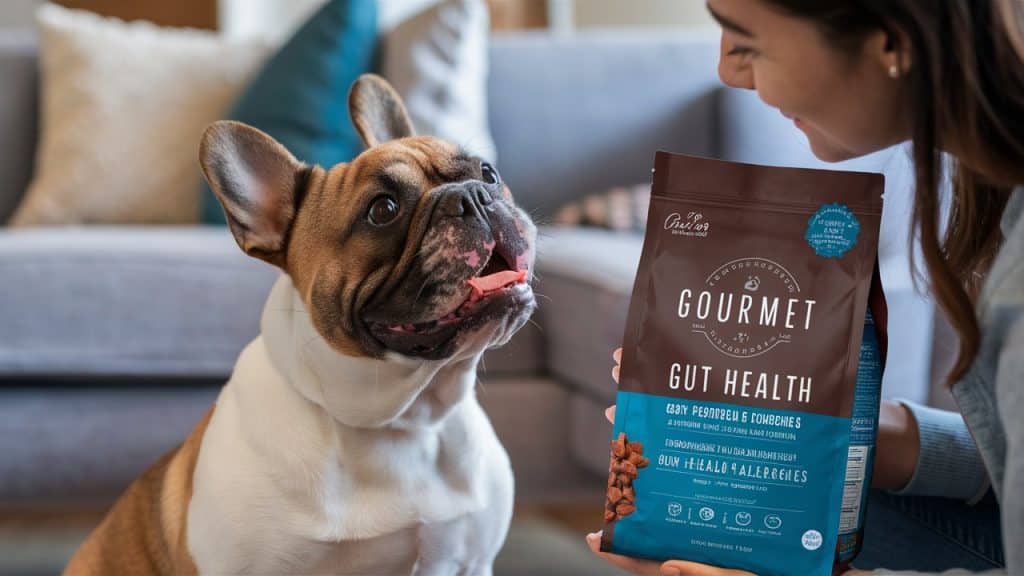Best Dog Food for Gut Health and Allergies
I still remember the days when my furry friend would suffer from gut issues and allergies, and mealtime would become a source of stress and discomfort for both of us.
Finding the best dog food for gut health and allergies can be a long journey. As a dog mom myself, I know how frustrating it can be to see our furry friends struggling with digestive issues or allergies.
Let's face it: our dogs' gut health is just as important as ours. A healthy gut means a happy pup, and that's exactly what we want for our beloved companions. But with so many dog foods on the market claiming to be the best for gut health and allergies, it can be overwhelming to choose the right one.
Here's some foods I highly recommend, please, take a look….great time saver….

As someone who's been in your shoes, I understand the importance of getting it right. That's why I've done the research for you, scouring the latest studies and expert advice to bring you the lowdown on what really works. From understanding the role of prebiotics and probiotics to navigating the complex world of allergens and intolerances, I'll be sharing my top tips and insights to help you make informed choices.
Now, I know what you're thinking: “What makes a dog food truly great for gut health and allergies?” Well, it all starts with understanding your dog's unique needs. Whether they're prone to food sensitivities or have a sensitive tummy, the right food can make all the difference. That's why I'll be exploring the key ingredients and nutrients that can help soothe and support your dog's digestive system.
So, if you're tired of feeling like you're stuck in a rut with your dog's diet, or if you simply want to give them the best possible start in life, then keep reading! In this blog post, we'll delve into the world of dog nutrition and explore the best dog food for gut health and allergies. Trust me, your pup will thank you.
Key Takeaways:
- Best dog food for gut health and allergies should contain probiotics and prebiotics to nourish the gut microbiome, easily digestible ingredients like sweet potato and pumpkin, and adequate fiber to support healthy bowel movements.
- Opt for novel proteins like venison, duck, or rabbit, and hydrolyzed proteins that are broken down into smaller pieces to minimize allergic reactions.
- Consult with your veterinarian to find the right food for your dog's individual needs and be patient during the trial and error process to find the perfect fit.
With symptoms that include itchy skin, ear infections and bloating, dog allergies can be a frustrating and uncomfortable experience — for pets and their humans. There’s good news, though: Food, contact or environmental allergy symptoms can be alleviated by certain foods
The Importance of Gut Health and Allergies in Dogs
Before we explore the world of dog food, it's necessary to understand the significance of gut health and allergies in our canine companions. As a pet owner, you want to provide your dog with the best possible life, and that starts with a healthy gut and managing allergies.
The Role of Gut Health in Overall Well-being
Allergies and gut issues can have a profound impact on your dog's overall health. A healthy gut is responsible for proper digestion, nutrient absorption, and a robust immune system. When gut health is compromised, your dog may experience a range of symptoms, from vomiting and diarrhea to behavioral changes and skin issues.
Common Symptoms of Gut Issues and Allergies
Symptoms of gut issues and allergies can vary, but some common signs include itchy skin, ear infections, gastrointestinal upset, and even behavioral changes. If you've noticed any of these symptoms in your dog, it's crucial to act and find a solution.
For instance, if your dog is experiencing frequent ear infections or skin issues, it may be a sign of an underlying allergy or gut issue. By addressing these problems, you can help alleviate your dog's discomfort and improve their overall quality of life.
Identifying Triggers and Choosing the Right Ingredients
Now that we've discussed the importance of gut health and allergies in dogs, it's time to probe the nitty-gritty of identifying triggers and choosing the right ingredients for your furry friend.
Common Allergens in Dog Food
To pinpoint the culprits behind your dog's allergies, it's imperative to know the common allergens found in dog food. Beef, chicken, dairy, and grains are often the usual suspects, and eliminating these ingredients from your dog's diet can help alleviate symptoms.
Novel Proteins and Hydrolyzed Proteins for Allergy Relief
Right off the bat, novel proteins like venison, duck, or rabbit can be a game-changer for dogs with allergies. These proteins are less likely to cause allergic reactions, making them an excellent alternative to common protein sources. Hydrolyzed proteins, which are broken down into smaller pieces, are also easier for sensitive stomachs to digest.
Hydrolyzed proteins, in particular, are a great option for dogs with severe food allergies. By breaking down the proteins into smaller molecules, the risk of an allergic reaction is significantly reduced. This makes hydrolyzed proteins an excellent choice for dogs with multiple food sensitivities.

Key Ingredients for Gut Health and Digestion
Food for thought: when it comes to promoting gut health and digestion, certain ingredients can make all the difference. Probiotics and prebiotics, for instance, work wonders in nourishing the gut microbiome and supporting immunity.
Allergens, such as beef or dairy, can wreak havoc on your dog's digestive system. By opting for easily digestible ingredients like sweet potato or pumpkin, you can provide your dog with imperative nutrients without putting their digestive system under stress. Adequate fiber content is also crucial for healthy bowel movements and preventing constipation.
By understanding the common allergens, novel proteins, and key ingredients for gut health, you can make informed decisions about your dog's diet and help them thrive.
Selecting the Best Dog Food for Gut Health and Allergies
Not all dog foods are created equal, and when it comes to gut health and allergies, it's crucial to choose a food that addresses your dog's specific needs.
Reputable Brands and Specialized Formulas
Specialized formulas from reputable brands can make all the difference in supporting your dog's gut health and alleviating allergy symptoms. Look for brands that offer high-quality ingredients and formulas designed specifically for gut health and allergies.
Consulting with Your Veterinarian for Personalized Recommendations
One of the most valuable resources in finding the best dog food for your furry friend is your veterinarian. They can provide personalized recommendations based on your dog's individual needs, health history, and allergies.
By working closely with your veterinarian, you can ensure that you're providing your dog with the best possible nutrition for optimal health and well-being.
Summing up
The journey to finding the best dog food for gut health and allergies may take time, but with persistence and the right guidance, you can unlock a world of comfort and wellness for your furry friend.
By understanding the importance of gut health, identifying common allergens, and selecting foods with key ingredients, you'll be well on your way to providing your dog with the nutrition they need to thrive
People also ask….
What are the common signs of gut health issues and allergies in dogs?
If your dog is experiencing vomiting, diarrhea, gas, or behavioral changes, it could be a sign of gut health issues. Allergies can manifest as itchy skin, ear infections, or gastrointestinal upset. Keep an eye out for these symptoms and consult your vet if you notice any changes in your dog's behavior or physical condition.
How do I identify the allergens causing my dog's allergic reactions?
Common culprits for allergies in dogs include beef, chicken, dairy, and grains. Try to pinpoint the specific ingredient causing the reaction by eliminating potential allergens from their diet and monitoring their response. You can also consider novel proteins like venison, duck, or rabbit, or hydrolyzed proteins that are easier to digest.
Can I make changes to my dog's diet on my own, or do I need to consult a veterinarian?
While it's great that you're taking proactive steps to address your dog's gut health and allergies, it's always best to consult with a veterinarian before making significant changes to their diet. They can provide personalized recommendations based on your dog's individual needs and health history. That being said, you can start by learning about the key ingredients that promote gut health and minimize allergic reactions, and then discuss your findings with your vet.




